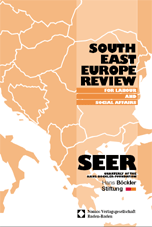From equality without democracy to democracy without equality? Women and transition in southeast Europe
From equality without democracy to democracy without equality? Women and transition in southeast Europe
Author(s): Ulf BrunnbauerSubject(s): Politics / Political Sciences
Published by: Nomos Verlag
Keywords: Women and transition;
Summary/Abstract: More than ten years after the beginning of transition, the balance sheet of the transformation of communist societies and centrally-planned economies into liberal democracies and capitalist market economies is still disputed. Some scholars put the emphasis on the increase in political liberties and hail the prospects of economic growth stimulated by privatisation and restructuring, while others focus on the enormous social costs of economic restructuring. But there are some points on which most observers agree, despite their different political backgrounds. One of these is that women as a group belong to the losers in the transition, as regards their social and economic status as well as political representation. In this article, I trace some of the paramount aspects of increased discrimination against women caused by the process of transformation in south-east European postcommunist countries (leaving Hungary and Moldavia out of the account). I relate those current developments to the communist legacy as well as to the inherent logic of capitalist restructuring. This allows us to unravel the seemingly paradoxical situation that traditional gender roles are reinforced by a process that should, allegedly, lead to a more modern society.
Journal: SEER - South-East Europe Review for Labour and Social Affairs
- Issue Year: 2002
- Issue No: 03
- Page Range: 151-168
- Page Count: 18
- Language: English

